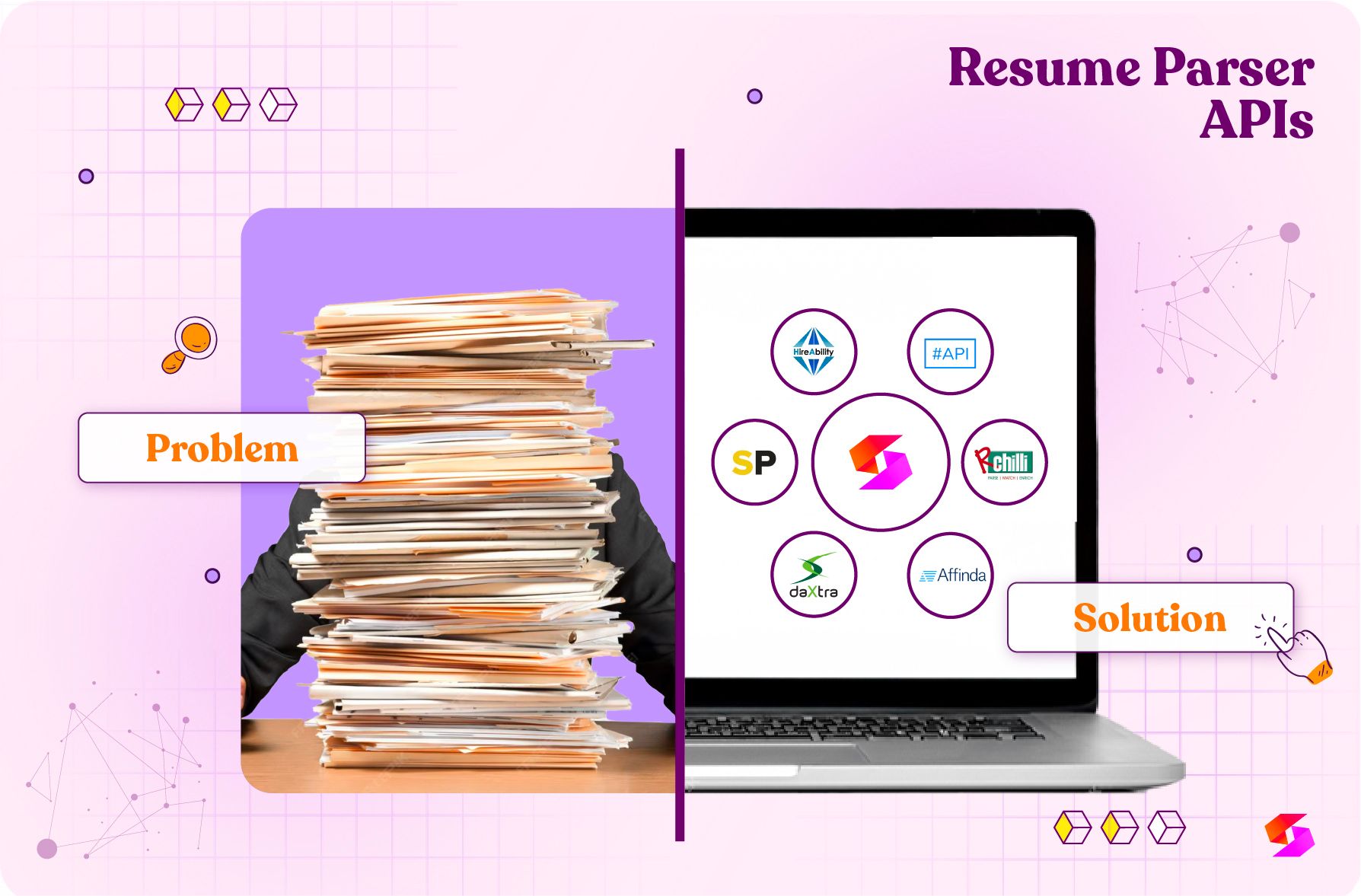Here are the top 7 AI resume parser APIs in 2026 to streamline your hiring process:
- Skima AI – extracts 200+ data points, 99% accuracy, 130+ integrations, secure, compliant API.
- Affinda – 100+ fields, API, ATS, Zapier integrations.
- RChilli – 140+ fields, Salesforce, Oracle, Zoho integrations.
- DaXtra – 150+ fields, CRM, ATS, job boards integrations.
- HireAbility – 200+ fields, ATS, HR systems integrations.
- SuperParser – 200+ fields, privacy-focused, GDPR-compliant.
- SharpAPI – Lightweight, AI-powered, structured JSON output.
These CV parsing APIs automate resume parsing, screening, enhance candidate matching, and integrate seamlessly with your existing systems.
Recruiters still spend hours each week sifting through resumes. Even though they only spend an average of 30 seconds on each one. Additionally, over 50% of resumes don’t meet basic job requirements, costing teams time and productivity.
To stay competitive, top hiring teams are using a resume parser API. This API extracts data and turns unstructured resumes into clean, searchable, and standard profiles in seconds.
We have researched and reviewed 7 powerful resume parsing APIs to help you find the best fit. Our detailed reviews cover their features, pros, and cons.
7 Best Resume Parser APIs for Accurate Results
We have researched, reviewed, and ranked the top 7 CV parsing API that stand out for their parsing power, integrations, and overall performance.
| # | Resume Parser API | Data Points Extracted | Integrations | Free Trial |
| 1 | Skima AI | 200+ fields | ATS, Job Boards, HRIS, HR systems | ✅ |
| 2 | Affinda | 100+ fields | API, ATS, Zapier | ✅ |
| 3 | RChilli | 140+ fields | Salesforce, Oracle, Zoho | ✅ |
| 4 | DaXtra | 150+ fields | CRM, ATS, Job Boards | ✅ |
| 5 | HireAbility | 200+ fields | ATS, HR systems | ✅ |
| 6 | SuperParser | 200+ fields | Not defined | ✅ |
| 7 | SharpAPI | Not defined | Not defined | ✅ |
1. Skima AI

Skima AI, an AI recruitment software, offers the most accurate resume parser API. It scans over 200 data points from PDF, DOC/DOCX, HTML, TXT, and image files in seconds. Then, it turns that data into a structured, searchable format.
Skima AI's CV parsing engine is built for recruiters and top hiring teams. It delivers structured outputs (JSON, CSV, XLS, PDF) and matches candidates to job requirements using in-house algorithms with ease and precision. Start now with the free plan.
Skima AI Features
As per Skima AI's official website and docs, these are its features:
- Extracted 200+ data fields (experience, certifications, legal matters, social links).
- Bulk upload and email integration are available.
- Flexible integrations for developers with ATSs, job boards, and more.
- The API supports multi-language parsing in over 56 languages, including Arabic, Thai, and Chinese.
- A developer-friendly API works seamlessly with ATS and HRIS.
- An advanced skills taxonomy includes sectors like IT, finance, legal, and healthcare. Custom taxonomies are also supported.
- GDPR and SOC2 compliant, no data is retained.
Skima AI's Resume Parser Pricing
| Plans | Pricing |
| Free Plan | $0 |
| Volume Plan | Custom |
✅ Pros of Skima AI
- High Parsing Precision at Scale: It handles complex resume layouts and extracts over 200 data points accurately. Users save time in screening and find better candidate matches.
- Seamless ATS Integration and Workflow Support: Bulk uploads, email parsing, and flexible output formats like JSON, CSV, and XLS make syncing candidate data easy.
- Strong Developer and Compliance Focus: It offers SDKs in various languages, GDPR/SOC 2 compliance, and no data retention, which is great for privacy-sensitive uses.
- Outstanding Customer Service: Verified reviewers praise Skima AI’s quick support and onboarding help, making the learning curve smoother for new users.
❌ Cons of Skima AI
- Non-transparent Pricing: The pricing information is not disclosed, so you need to contact sales to obtain detailed pricing information.
2. Affinda

Affinda leads in document AI that focuses on automating resume and job description parsing. Their CV parsing API supports HR platforms, job boards, and ATS systems. It processes over 250 million documents with around 95% accuracy across various formats and languages.
With a strong customer focus and flexible plans, Affinda provides recruitment teams with structured data. This helps them scale talent operations efficiently and precisely.
Affinda Features
According to the official site and product docs, Affinda’s resume parsing API offers:
- 100+ structured fields (e.g., work experience, education, certifications, skills taxonomy).
- Multi-language parsing in 56+ languages, including Arabic, Thai, Chinese, and more.
- Multi-format support: PDF, DOCX, JPG/PNG images, TXT.
- A developer-friendly API works with ATS and HRIS.
✅ Pros of Affinda
- High Parsing Accuracy: Affinda delivers around 95% accuracy in key resume areas. It outshines many competitors, especially in pulling out skills, experience, and education data.
- Multilingual Support: It supports over 56 languages, making it great for global hiring. It works well with resumes in non-English formats.
- Flexible Integration: The REST API is easy to use and well-documented. This makes it simple to add to ATS, CRMs, or job platforms without much hassle.
- Responsive Support Team: Users appreciate quick onboarding, easy custom field creation, and prompt technical support. This is especially helpful for teams with changing parsing needs.
❌ Cons of Affinda
- Slight Latency in Response Time: Parsing resumes can take 2–3 seconds per document. This may be too slow for real-time workflows or synchronous systems.
- No Native Dashboard: There isn’t an admin panel to track usage or manage API keys. This means you need external tools or engineering workarounds.
- Parsing Inconsistencies in Niche Fields: Sometimes, it misclassifies certifications or education from non-traditional schools. This is especially true in specialized industries or for non-Western resumes.
- Limited Analytics and UI tools: It focuses on backend parsing and doesn't offer built-in analytics, validation, or a user interface. This can be a drawback for teams wanting a complete parsing and review solution.
3. RChilli

RChilli provides a resume parsing solution. Its API processes thousands of documents annually, using deep learning and NLP to extract structured candidate data and turn unstructured resumes into actionable insights within seconds. The solution supports a broad range of formats and languages.
RChilli Features
According to RChilli’s official site and documentation, its CV parser API includes:
- Multilingual parsing that auto-detects language and extracts fields from resumes in over 40 languages.
- 140+ structured data fields that convert resumes into rich JSON/XML output covering experience, education, skills, taxonomy IDs, and more.
- Bulk Upload and Email Integration that parses large batches via FTP or pulls from email inboxes instantly.
- Executive and management summaries that generate high-level resume overviews to speed recruiter review.
- Configurable fields and bias redaction that enable toggling PII fields, such as name, age, and gender, to support fair hiring.
✅ Pros of RChilli
- Fast Parsing Speed: Users praise RChilli’s rapid processing time, enabling high-volume workflows to run smoothly.
- Data Extraction: Collects structured information from 140 fields and automatically generates executive summary profiles. This helps in gaining thorough insights into candidates.
- Global Language Support: Works with over 40 languages and offers reliable auto-detection and localization.
❌ Cons of RChilli
- Occasional Parsing Gaps on Scanned/Resume Images: Some users report missing or inaccurate data on image-based or poorly formatted resumes.
- Non-transparent Billing Issues: A few reviewers mentioned confusing auto-renewal and unexpected charges despite straightforward API usage.
- Minimal Built-in UI or Dashboard: Most workflows rely entirely on API calls; there’s no native analytics or tracking interface.
- Setup Complexity for Advanced Features: Advanced customisation needs manual tuning and technical knowledge, which might slow down initial deployment.
4. DaXtra
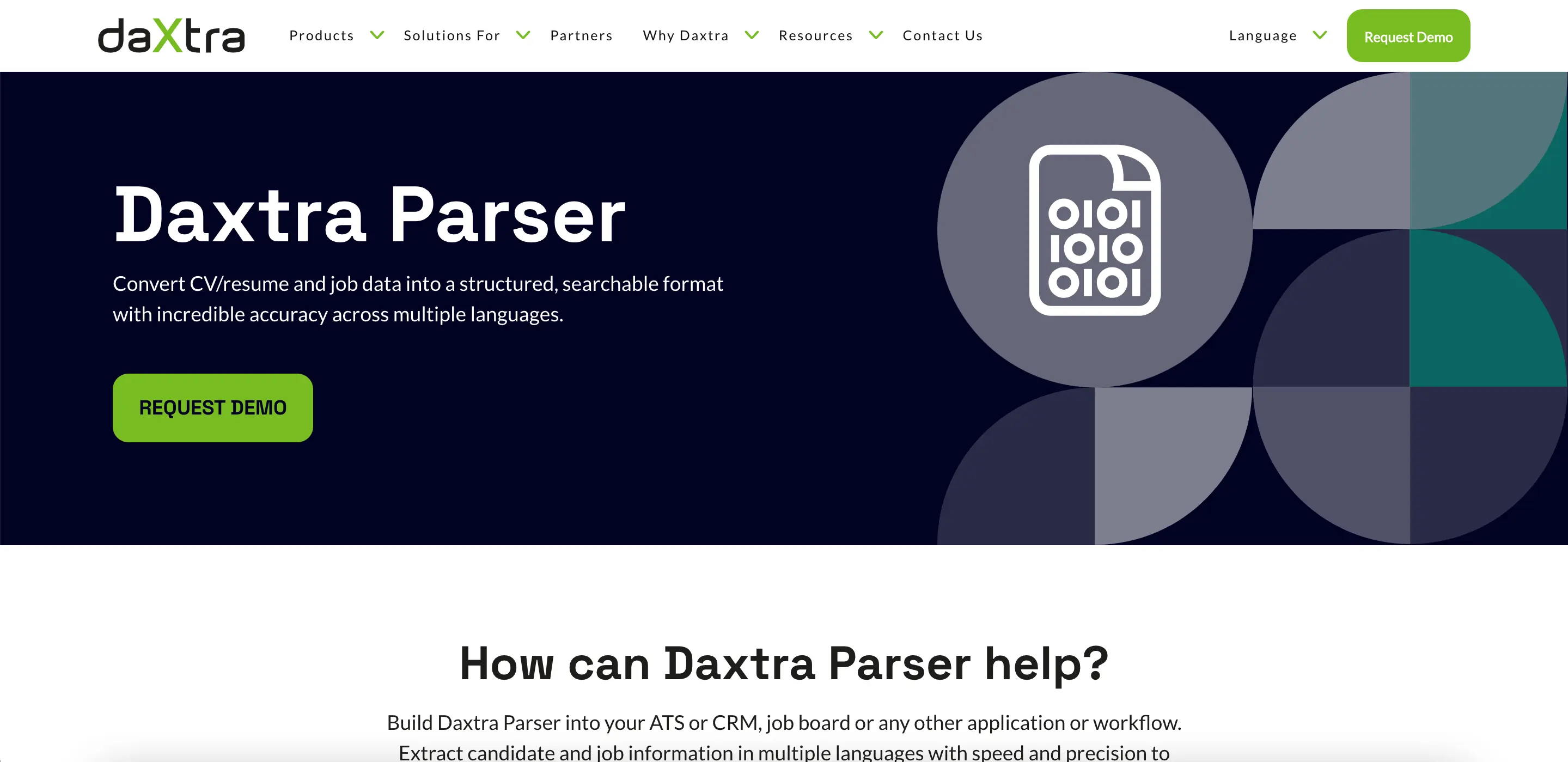
DaXtra’s resume parser API extracts structured data from resumes and CVs accurately. It supports over 40 languages and 150+ fields. You get clean JSON or XML output, making it perfect for easy integration into ATS, CRMs, or job boards. Moreover, the API is customizable and supports REST and SOAP.
DaXtra Features
Based on DaXtra's official site, these are the features of its resume reader api:
- Multilingual parsing for over 40 languages helps automatically detect and parse resumes. This feature offers great support for different geographic formats.
- The system extracts more than 150 data fields. This includes personal info, work history, education, skills, job details, and social or contact links.
- It delivers structured output in XML or JSON, ensuring a clean and well-defined schema that suits ATS or CRM ingestion.
- Flexible integrations via REST or SOAP APIs.
- An advanced skills taxonomy includes sectors such as IT, finance, legal, and healthcare. It also allows for custom taxonomies.
✅ Pros of DaXtra
- High Parsing Accuracy Across Formats: Users mention reliable extraction of resumes into structured data, with minimal errors detected post-integration.
- Strong Multi-source Integration: DaXtra pulls resumes from ATS, job boards, and social profiles into one system, streamlining candidate data ingestion.
- Customer Support and Onboarding: Some reviews highlight proactive support, hands-on training, and smooth customization to fit business workflows.
❌ Cons of DaXtra
- Steep Learning Curve: Setup, custom fields, and integration require technical knowledge and time to learn.
- Limited Built-in Dashboards and Analytics: Users need to create their own monitoring dashboards because there is no built-in UI for insights.
- Occasional Parsing Hiccups with Complex Layouts: Image-heavy or graphically rich resumes sometimes result in dropped or misread fields.
5. HireAbility
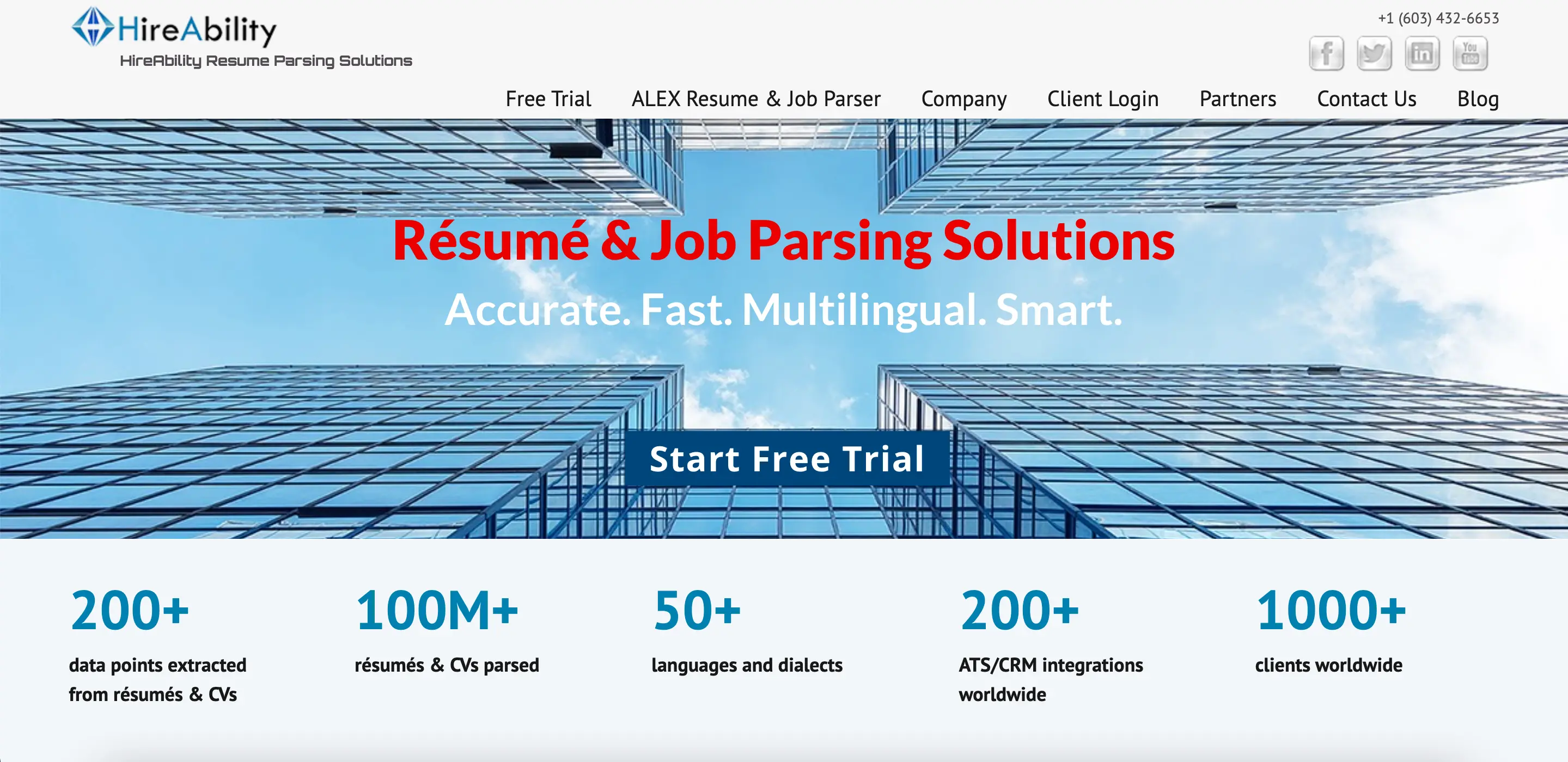
HireAbility offers a CV parser API (ALEX) built for HR tech platforms, ATSs, and job boards. It converts unstructured resumes into structured, machine-readable formats like JSON and HR-XML.
With support for 50+ languages, OCR for scanned resumes, and strong semantic parsing, HireAbility is designed for accurate data extraction in large-scale hiring workflows.
HireAbility Features
From the official site, ALEX offers:
- 200+ data fields extracted (experience, certifications, legal matters, social links).
- Supports 50+ languages/dialects, with multi-language resumes parsed in a single pass.
- OCR technology handles scanned resumes (PDFs, images).
- Smart semantic parsing using NLP, patterns, and ontologies for context-aware extraction.
- Flexible output and integration via REST/SOAP, JSON, or HR-XML, with code samples and trial support.
✅ Pros of HireAbility
- High Accuracy: Users appreciated ALEX for its precise extraction, even from varied layouts.
- Multilingual, Multi-dialect parsing: Processes resumes in 50 languages, auto-detecting mixed-language content reliably.
- Built-in OCR for Scanned Resumes: It turns PDFs and images into structured data. This process skips manual pre-processing.
❌ Cons of HireAbility
- Slower Processing: Scanned or graphically rich resumes may take several seconds to load, which affects real-time workflows.
- Minimal Native Dashboard or Analytics UI: Users depend on custom reports. ALEX gives raw data but lacks built-in monitoring.
- Setup of Specialized Fields demands Technical Effort: Custom ontologies and semantic adjustments require engineering time.
- Volume billing can confuse smaller teams: Pre-purchasing parse credits might feel overwhelming for small buyers who are used to simple monthly plans.
6. SuperParser
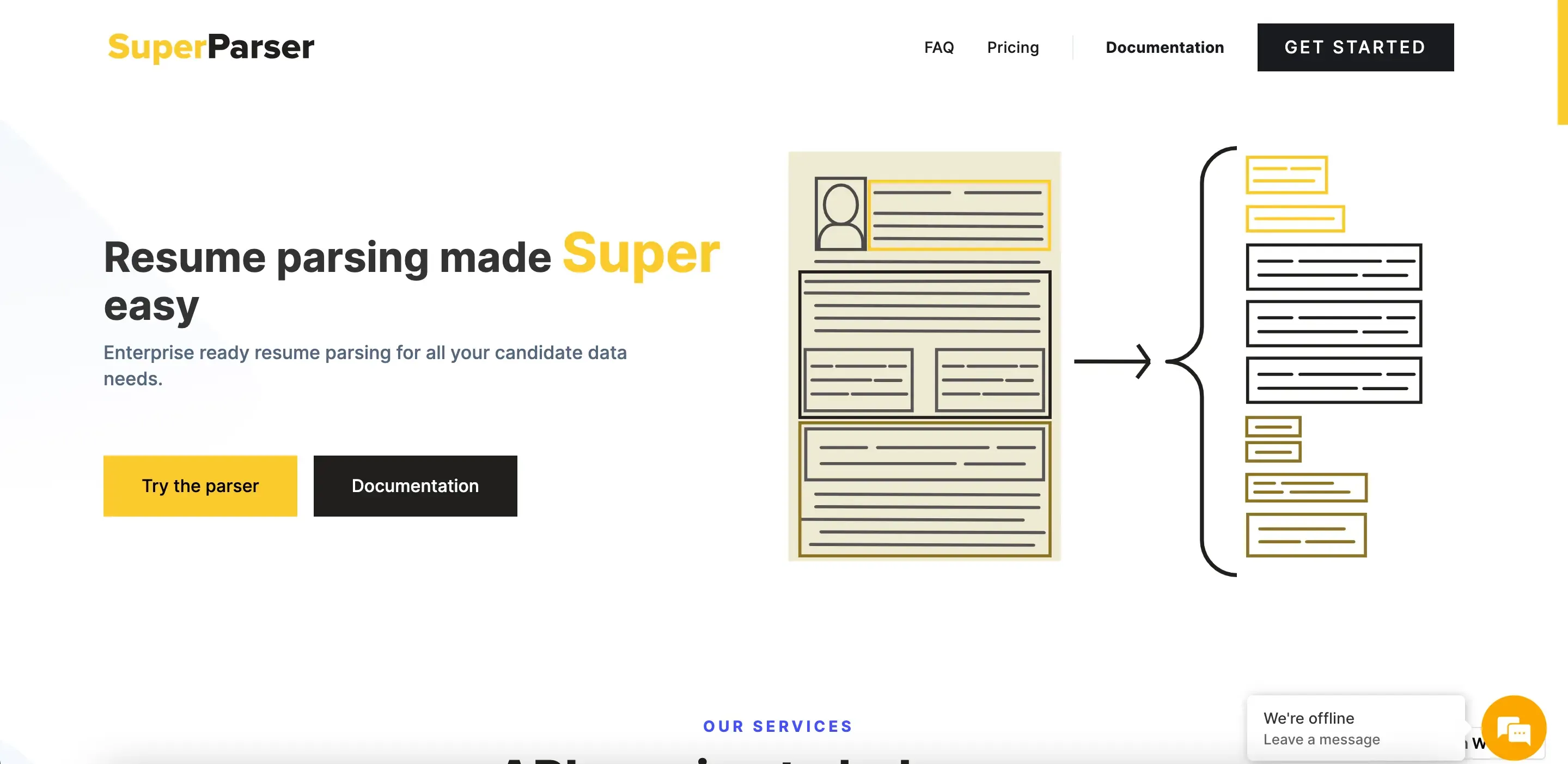
SuperParser offers a resume parsing API designed for HR platforms, ATS providers, and job board integrations. It extracts over 200 candidate fields, including contact info, work history, and skills.
It also provides structured JSON/XML outputs without storing data on its end. Plus, the endpoints follow GDPR in the EU.
SuperParser Features
Based on SuperParser's official site, its features are as follows:
- Over 200 candidate data fields provide contact information, work experience, education, skills, certifications, and social links.
- The cloud infrastructure provides almost total uptime via Google Cloud. It easily handles high-volume parsing.
- With a privacy-first architecture, SuperParser does not retain data and is GDPR-compliant.
- Its developer-friendly REST API makes integration easy. It comes with documentation and free-tier testing.
✅ Pros of SuperParser
- Scalable and Affordable: Users say it’s a budget-friendly parser that handles large volumes of resumes well.
- Supports Multiple Formats: Easily handles PDF, DOCX, and scanned documents. It extracts data accurately from over 200 fields.
- Privacy-first Design: It follows a strict no-data-retention policy. This means all candidate data gets removed after parsing, which boosts compliance.
❌ Cons of SuperParser
- English-only Parsing: Currently supports only English resumes, which limits usefulness for international hiring.
- No Native Analytics or UI Dashboard: Entirely API-driven, requiring separate tools for usage tracking or data visualization.
- Credit-based Pricing Nuance: Uses a credit consumption model that may need careful management to avoid unexpected costs.
7. Resume Parser API by SharpAPI
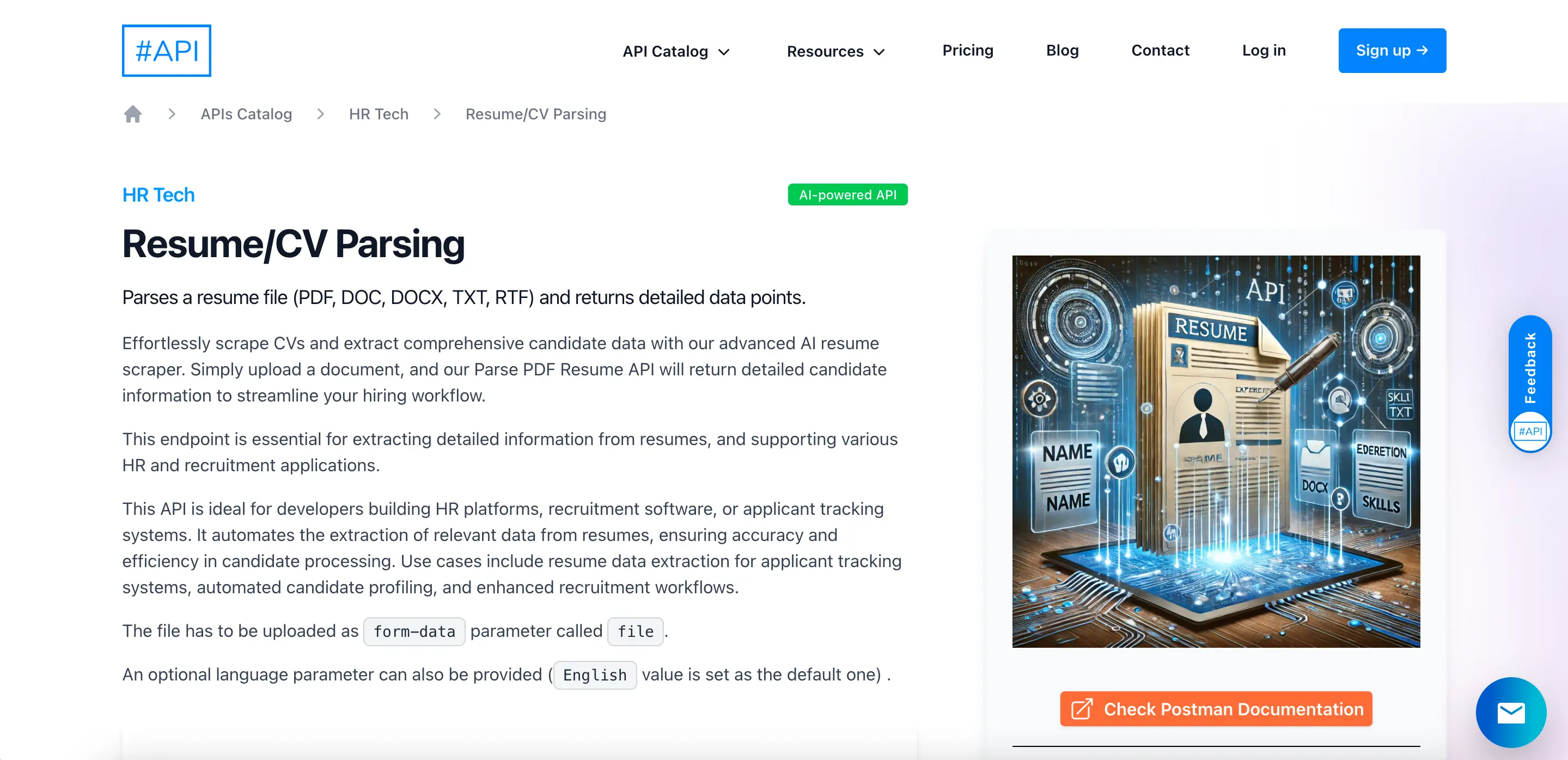
Resume Parser API by SharpAPI is a lightweight, AI-powered service designed for HR platforms, ATSs, and job boards. It accepts PDFs, DOCX, TXT, and RTF formats and transforms them into structured JSON.
Moreover, it integrates easily via REST and supports job polling and webhooks. This ensures quick, reliable parsing without storing personal data.
Resume Parser API by SharpAPI Features
According to SharpAPI’s official documentation and catalog:
- Multi-format resume support includes compatibility with PDF, DOC, DOCX, TXT, and RTF files.
- An optional language parameter is available, defaulting to English but allowing for other specified languages.
- Polling and webhook support allow you to submit jobs, check their status, and receive real-time updates using webhooks.
- Extensive data output extracts all essential fields, such as contact information, skills, employment history, education, and certifications.
- No candidate data is retained after processing to ensure compliance with GDPR standards.
✅ Pros of Resume Parser API by SharpAPI
- Supports Various Formats: It works well with PDF, DOCX, TXT, and RTF files, ensuring smooth integration across HR systems.
- Developer-centric Workflows: It supports job polling and webhook delivery. This is great for flexible, custom parsing pipelines.
- Strong Privacy Focus: The tool deletes data automatically after parsing. This meets GDPR rules and does not keep candidate information.
- Great SDK Availability: It provides official libraries for Node.js, Python, Laravel, .NET, and PHP. This speeds up implementation.
❌ Cons of Resume Parser API by SharpAPI
- Language Support Limited: Primarily optimized for English, performance may degrade with non-English resumes.
- Credit-based Pricing: The Consumption model requires monitoring to avoid unexpected overages.
- No UI for Analytics: There are no built-in dashboards. Teams have to create their own reporting tools for tracking usage and performance.
- No Candidate Scoring Features: It provides structured data only and does not create fit rankings or executive summaries.
How to Choose the Best Resume Parser API?
With thousands of resumes coming in from job boards, referrals, and career sites, manually sorting candidate data isn’t enough anymore. A resume parsing API can automate this at scale, but not all APIs are built the same. Some excel in speed, others in field coverage, and a few are privacy-first by design.
To pick the right one for your company or hiring workflow, focus on these must-have capabilities:
1. Parsing Accuracy Across Formats
Search for APIs that can extract data from different file types, such as PDF, DOCX, TXT, and RTF. They should also work well with complex or non-standard resume formats. Poor parsing can cost you top candidates by misclassifying key details.
2. Multilingual Support
If you hire globally, make sure the parser supports multiple languages. Leading tools like Skima AI support 40+ languages, which helps scale international hiring pipelines.
3. Data Fields and Granularity
Ensure the API extracts deep, structured data, not just names and emails. The right parser, like Skima AI, should cover over 200 fields. These include skills, education, certifications, social profiles, and more.
4. Integration Flexibility
Next, choose a tool with REST or SOAP APIs, sample SDKs, and webhook support. This speeds up development and helps you plug the parser into your ATS, CRM, or workflow engine with minimal effort.
5. Compliance and Data Privacy
Resume data is sensitive. So, prioritise APIs like Skima AI. They don’t store personal data after processing. They also offer GDPR compliance and support on-premise or EU-hosted options if needed.
5 Best Practices for Resume Parsing
Even the best resume parser API can underperform if it’s not used correctly. To get clean, reliable candidate data and avoid costly errors in hiring decisions, follow these proven best practices:
1. Accept Resumes in Preferred Formats
While most parsers handle PDF and DOCX, parsing is typically most accurate with text-rich, non-scanned files. If you accept image-based or scanned resumes, ensure your parser has strong OCR capabilities.
2. Clean and Standardize Data Before Use
Always run parsed data through a normalization layer. This cleans up inconsistencies in job titles, locations, skills, or education names. So, it improves the quality of search, filters, and ranking.
3. Evaluate Parser Accuracy Regularly
Conduct internal accuracy tests on sample resumes to measure precision in key fields such as name, email, skills, and work history. If the accuracy level drops, reach out to the vendor or consider adjusting the extraction rules (if supported).
4. Stay Updated with New Resume Trends
Resumes are changing, with features like portfolio links, AI-generated summaries, and non-linear formats. Pick a parser that's regularly updated and trained on modern resume styles to prevent drop-offs.
5. Prioritize Candidate Privacy
Parsed resumes often contain personally identifiable information. Use APIs that do not store personal data after processing and comply with standards such as the GDPR or CCPA. This protects your users and reduces the risk of non-compliance.
Summary
We explored the best CV parser APIs to help you find the right fit for your company, workflow, and growth goals. From parsing speed to data depth, accuracy to compliance, every detail matters.
Don’t treat parsing as a plug-and-play utility, treat it as core infrastructure. The right parser can be the difference between speed and delay, relevance and noise.
When hiring moves fast, your tools need to move faster. Skima AI’s Resume Parser API is built to keep pace with the fastest performance, pinpoint accuracy, and real support when you need it. Sign up for free now and see how much time and talent you save.
Frequently Asked Questions
1. What is a resume parser API?
A resume parser API extracts structured data such as names, skills, and experience from resumes. It works with formats like PDF, DOCX, and images. This tool helps recruiters filter and search resumes more easily.
2. How accurate is Skima AI’s resume parser?
Skima AI claims industry-leading accuracy, parsing over 200 data points per resume with high precision, even in complex formats and multilingual CVs. It’s built specifically for recruitment workflows.
3. Does Skima AI support bulk resume parsing?
Yes, Skima AI supports bulk uploads via API or dashboard. It also allows parsing resumes from emails and LinkedIn. This makes it easier for recruiters to handle large volumes of resumes quickly and efficiently.
4. Which file formats does Skima AI resume parser support?
Skima AI supports DOC, DOCX, PDF, TXT, HTML, and image formats. This makes it highly flexible for parsing resumes in any format received during the hiring process.
5. Can I integrate Skima AI with my existing ATS or job board?
Yes, Skima AI offers developer-friendly APIs with flexible integration options for ATSs, job boards, and HRIS platforms. JSON, CSV, XLS outputs are supported for easy syncing.
6. Is Skima AI GDPR and SOC 2 compliant?
Yes, Skima AI is fully GDPR and SOC 2 compliant. It also does not retain candidate data, ensuring privacy and legal compliance for all users and organizations.
7. Does Skima AI offer a free plan for resume parsing?
Yes, Skima AI provides a free plan that lets users test its resume parsing capabilities before upgrading. This is great for startups or developers trying the API.

